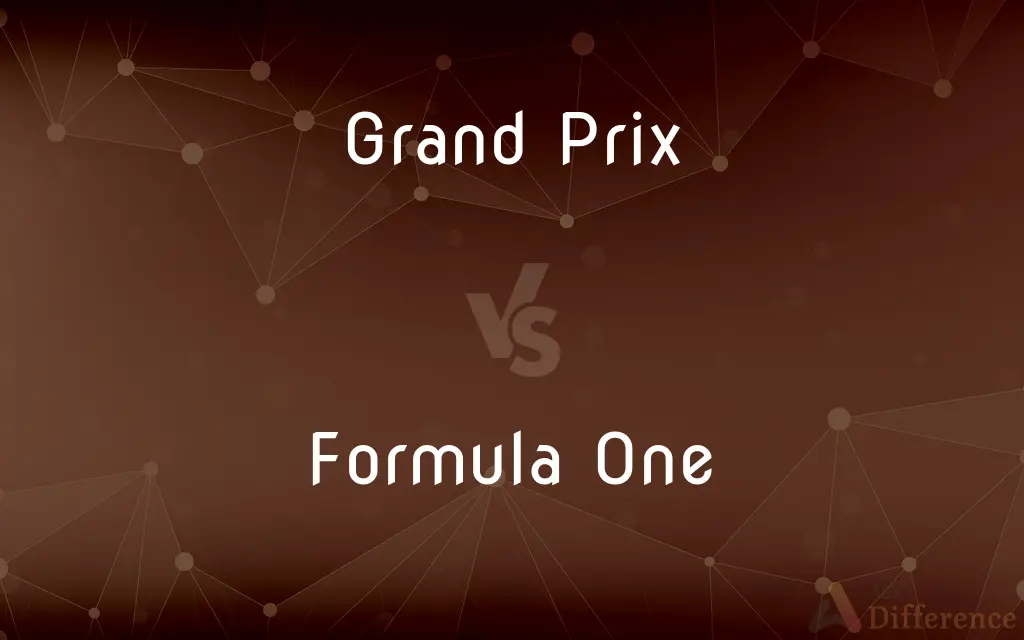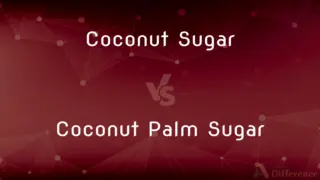Grand Prix vs. Formula One — What's the Difference?
By Tayyaba Rehman & Maham Liaqat — Published on August 16, 2024
Grand Prix refers to a series of auto races globally, while Formula One is a premier class of such races, known for its high-speed and advanced technology.

Difference Between Grand Prix and Formula One
Table of Contents
ADVERTISEMENT
Key Differences
Grand Prix races are international competitions in auto racing, encompassing various classes and types of cars. These events are held on different types of tracks, including street circuits and closed racetracks. Formula One, on the other hand, is a specific category within the Grand Prix that represents the pinnacle of car racing technology and driver skill, featuring open-wheel, single-seater cars.
Formula One is governed by strict regulations set by the Fédération Internationale de l'Automobile (FIA), focusing on car design, safety, and performance standards. These regulations ensure that F1 remains at the forefront of automotive technology and competition. Grand Prix races, while also regulated, can vary more widely in their rules depending on the specific series or class of racing.
The term "Grand Prix" was used long before the establishment of the Formula One World Championship in 1950, dating back to the early 20th century. It encompasses a wide range of motor racing events. Formula One, however, has become synonymous with the highest level of international motor racing.
One key difference is the global following and commercial scale of Formula One, which has grown to become a major international sporting event, attracting millions of fans, extensive media coverage, and significant corporate sponsorship. Grand Prix events outside of Formula One, while prestigious, typically do not match F1's scale of viewer engagement and financial turnover.
The technological innovation in Formula One cars is unmatched, with teams spending millions on development to gain a competitive edge. Grand Prix races in other categories might not have the same level of technological intensity or financial investment in car development.
ADVERTISEMENT
Comparison Chart
Definition
A series of auto races held globally.
The premier class of international auto racing.
Vehicle Type
Various, including sports cars and open-wheelers.
Open-wheel, single-seater race cars.
Governing Body
Varies by race series.
Fédération Internationale de l'Automobile (FIA).
Technological Focus
Varies, generally high but less than Formula One.
Highest, with cutting-edge automotive technology.
Audience and Reach
Broad, but varies by event and location.
Global, with millions of fans and extensive media.
Compare with Definitions
Grand Prix
Often part of a racing series or championship.
He competed in several Grand Prix races last season.
Formula One
Features technologically advanced single-seater cars.
Formula One cars are known for their speed and agility.
Grand Prix
A prestigious auto racing event held worldwide.
The Monaco Grand Prix is one of the most famous races in the world.
Formula One
Attracts a global audience and significant sponsorship.
Formula One races are watched by millions worldwide.
Grand Prix
Can feature different types of cars and classes.
The Grand Prix included both prototype and GT classes.
Formula One
Represents the pinnacle of auto racing technology.
Formula One continues to push the boundaries of automotive innovation.
Grand Prix
Known for diverse tracks, including street circuits.
The Singapore Grand Prix takes place on a challenging street circuit.
Formula One
The top category in world motor racing.
She dreams of becoming a Formula One driver.
Grand Prix
Attracts a wide range of competitors and teams.
Teams from all over the world participate in Grand Prix events.
Formula One
Governed by strict FIA regulations.
Formula One teams must adhere to a new set of regulations this year.
Common Curiosities
Can a race be both a Grand Prix and part of Formula One?
Yes, all Formula One races are considered Grand Prix, but not all Grand Prix races are part of Formula One.
What is Formula One?
Formula One is the highest class of international auto racing for single-seater formula racing cars.
What kind of cars are used in Formula One?
Formula One uses single-seater, open-wheel race cars designed under strict regulations.
What is a Grand Prix?
A Grand Prix is an auto race of international prestige, which can vary in terms of the type of cars raced and the rules.
What makes Formula One cars unique?
Their advanced technology, aerodynamics, and performance standards set them apart.
How does Formula One differ from other Grand Prix races?
Formula One races are a specific subset of Grand Prix races, characterized by their high level of technology, regulations, and global following.
Where are Grand Prix races held?
Grand Prix races are held on various tracks worldwide, including street circuits and dedicated racetracks.
Who can compete in a Grand Prix race?
Competitors vary by event, with some races open to various classes and others limited to specific vehicle types.
Is Formula One the most popular form of auto racing?
Formula One is among the most popular and globally recognized forms of auto racing.
How are Grand Prix races regulated?
Regulations vary by series, but Formula One races are strictly governed by FIA rules.
How are points awarded in Formula One?
Points are awarded based on finish positions, with higher positions receiving more points towards the championship.
What role do sponsors play in Formula One?
Sponsors provide crucial funding and support, contributing to the sport's commercial success.
Can anyone attend a Grand Prix race?
Yes, fans can purchase tickets to attend, though prices and availability vary by event.
What does it take to win a Formula One race?
Winning requires a combination of a highly skilled driver, advanced car technology, and strategic team support.
What is the future of Formula One?
Formula One continues to evolve, focusing on sustainability, technological innovation, and global expansion.
Share Your Discovery

Previous Comparison
Role Conflict vs. Role Strain
Next Comparison
Coconut Sugar vs. Coconut Palm SugarAuthor Spotlight
Written by
Tayyaba RehmanTayyaba Rehman is a distinguished writer, currently serving as a primary contributor to askdifference.com. As a researcher in semantics and etymology, Tayyaba's passion for the complexity of languages and their distinctions has found a perfect home on the platform. Tayyaba delves into the intricacies of language, distinguishing between commonly confused words and phrases, thereby providing clarity for readers worldwide.
Co-written by
Maham Liaqat












































